Brooks Vs Asics Running Shoes: Comparing The Differences
Author:
Unlock your full potential by engaging with our experts and community! Have questions about your fitness journey or looking for expert advice on weightlifting techniques? Don’t hesitate — leave a comment below and Oleksandr Zagrebelnyi will provide a personalized answer and insights to help you reach your goals.
Torokhtiy is reader-supported. Some links are affiliate links, and we may earn a commission at no extra cost to you. See our disclosure page for details.
Are you in search of the best running shoes to use for your next race? Choosing between Brooks vs Asics running shoes can be tricky. Both are popular brands, but they come with different features and qualities.
In this blog post, we’ll guide you through everything from the most popular models to factors such as construction, stabilization, fit, and comfort. Read on to learn about Asics vs Brooks running shoes so you know which one is right for you!
Brooks Or Asics Running Shoes? — Both provide an array of quality models to accommodate different terrain types, runners’ feet, sizes, and comfort levels. Brooks DNA Loft cushioning provides lightweight durability, while ASICS gel cushioning ensures max shock absorption for long runs.
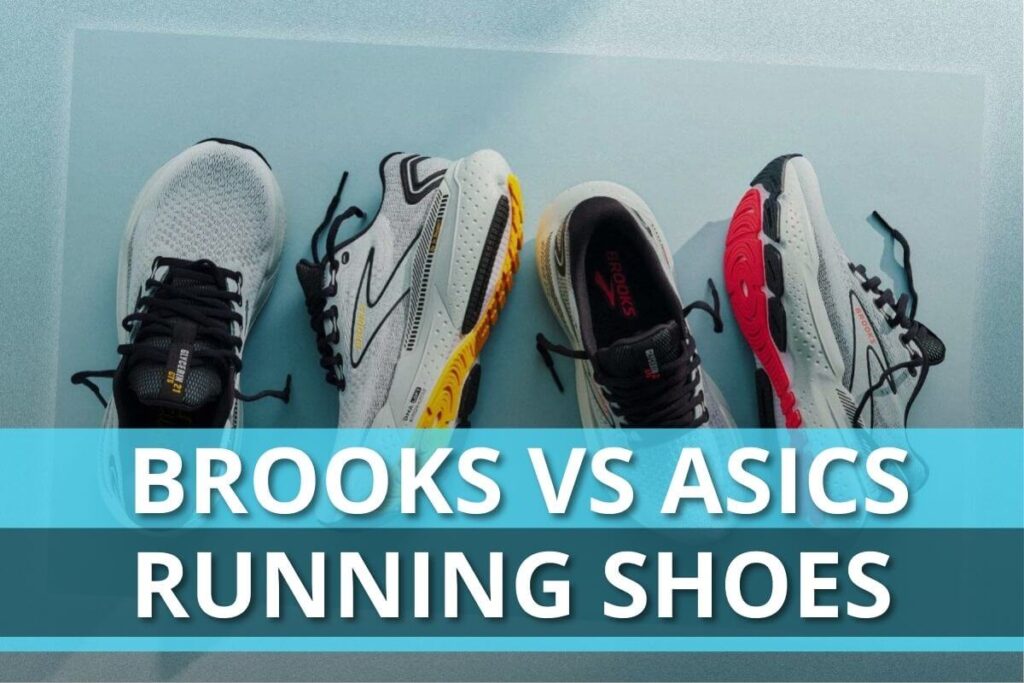
What Are Brooks Running Shoes?
Brooks running shoes have long been preferred by athletes for their durability and performance-enhancing features. The brand has earned a reputation among runners as one of the top choices in terms of comfort, support, fit, and quality.
Brooks has an extensive range of footwear designed to address different needs—from support to neutral—so running enthusiasts can find the perfect shoe that fits them best. Brooks takes into account individual foot types when designing its shoes, with different cushioning solutions to optimize runner performance.
Different levels of arch support allow users to take full advantage of midsole technologies, while removable insoles reduce overall pressure on the foot.
In terms of size, Brooks tend to run slightly larger than other shoes, so those with wider feet may find that they fit well.

What Are ASICS Running Shoes?
ASICS offers an assortment of running shoes for different surfaces, and incorporates solutions for various common foot problems affecting runners. They provide a variety of styles, constructions, cushioning systems, fits, and features to appeal to different types of runners.
ASICS uses a number of different technologies, like gel cushioning in the midsole, which offers superior shock absorption for maximum impact protection during long runs or races. Its FlyteFoam technology delivers lightweight durability that is up to 55% lighter than standard EVA foam midsoles.
ASICS running shoes have been designed with runners’ foot problems in mind. Runner’s feet come in different shapes and sizes, so the company uses technologies and designs that specifically cater to various foot types, providing comfortable cushioning and support for different runners.
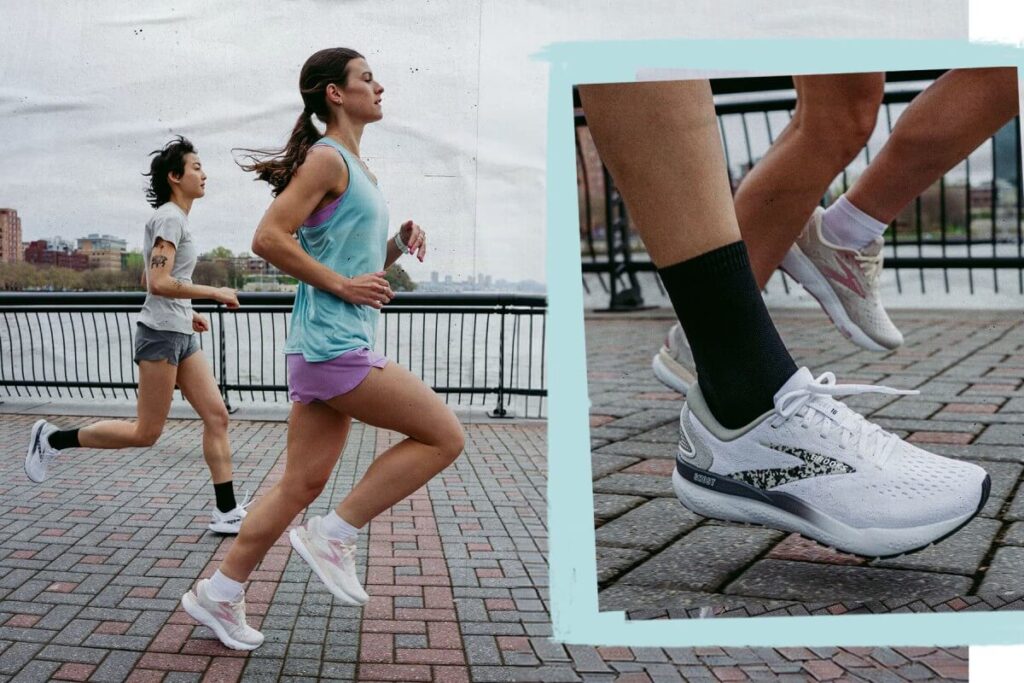
Brooks Vs Asics: The Main Differences
Both brands have a number of different features related to construction, cushioning, stability, and support, in order to provide your foot with the best performance possible when running. It’s important to understand the differences between Brooks and ASICS when deciding on a pair of shoes
1. Construction And Cushioning
Both Brooks and ASICS running shoes offer superior cushioning and support. The midsoles of both brands are constructed from similar EVA foam. When choosing between Brooks vs Asics for plantar fasciitis, it is important to note that both manufacturers have proper midsoles.
Brooks running shoes feature their signature DNA midsole technology, which is designed to absorb initial shock and keep your feet stable over long runs.
ASICS utilizes a gel-infused cushion system within its midsole technology to dampen heel strike impact while maintaining responsive energy return.
2. Stability And Support
Brooks has a range of shoes designed to provide the perfect balance of cushioning and stability on your runs. The Adrenaline GTS 22 is their most popular stability shoe, built specifically to correct overpronation, with plush cushioning for extra comfort.
ASICS stands out for its durable, run-specific support, thanks to two core technologies: FlyteFoam Lyte Technology and Gel Cushioning System.
Arch stabilizers have been included in specific models from both brands to offer support from heel to toe, while still allowing for enough flexibilityto prevent the restriction of movement on different surfaces.
3. Fit And Comfort
When it comes to the fit and comfort of running shoes, Brooks and ASICS offer key differences. In general, Brooks has a roomier toe box compared to ASICS, which has a snugger fit in the midfoot and heel.
This means runners with wide feet may find that Brooks offer better support, while those who want a tighter fit may opt for ASICS instead. Both feature lightweight designs, as well as breathable materials to keep your feet cool throughout runs.
| Criteria | ASICS | Brooks |
|---|---|---|
| Durability | 450-500 miles | 300-500 miles |
| Breathability | Ortholite material | Knit upper |
| Fit | Regular/Narrow | Regular/Wide/X-Wide |
| Cushioning | Flytefoam/Gel | DNA Foam options |
| Stability | Duomax midsole | Responsive midsole |
| Price | $100-$160 | $100-$150 |
Are Brooks Or Asics Better?
It can be difficult to decide between Brooks running shoes and ASICS running shoes. When it comes to overall performance, comfort, durability, and price range, both brands offer excellent options for runners looking for the perfect pair of shoes.
However, there are notable differences in design and features that could influence your decision. Brooks shoes provide great cushioning, thanks to their midsole foam, which provides greater energy return than other materials used in the market.
They also have wider designs, which provide more freedom of foot movement, without feeling too constricted or uncomfortable. They also tend to last longer due to their durable construction.
ASICS, on the other hand, emphasize stability by featuring supportive midsole technology. This delivers maximum cushioning and an exceptional lightweight experience.
Brooks Vs Asics: Summary
Overall, Brooks and ASICS running shoes both have advantages and disadvantages, depending on the runner’s needs. While some runners prefer ASICS for their lightweight construction, others like Brooks for their optimal cushioning and comfort.
Let’s discuss the pros and cons of each brand:
1. Pros And Cons Of Brooks Running Shoes
Brooks running shoes are popular among runners in search of extra protection, stability, and support. The brand features a unique, ballistic rock shield EVA for added protection on trail runs, plus a custom stability line for runners who need more support.
Additionally, there’s an impressive array of sizes and styles to select from to fit different runners’ needs. However, Brooks options can be more pricey than ASICS.
2. Pros And Cons Of ASICS Running Shoes
Asics running shoes are renowned for their performance-enhancing technologies and range of sizes. Many runners appreciate the cushioning, support, stability, and responsiveness that the FlyteFoam Lyte technology offers.
Additionally, ASICS gel-cushioning helps reduce shock impact during long runs. Furthermore, the brand’s signature Guidance Trusstic System provides a smooth transition by controlling excessive foot movement when taking off or landing during a stride.
The drawback to ASICS shoes is that they have been criticized as being narrow and relatively heavy.
| Pros of ASICS Shoes | Cons of ASICS Shoes | Pros of Brooks Shoes | Cons of Brooks Shoes |
|---|---|---|---|
| Lightweight and extra-flexible construction | Too narrow to fit extra wide feet | Plush comfort and soft touch | May not be snug enough for narrow feet |
| Specializes in running shoes | May not provide enough stability for beginners | Options for all types of arches and gaits | The upper may wear out a bit faster |
| Increased breathability | Reliable support and stability | ||
| More durable | Extra wide fit available |
Let’s take a look at the best Brooks running shoes and how they can help you in achieving your fitness goals:
Brooks Men’s Ghost 14 Neutral Running Shoe
The Brooks Men’s Ghost 14 is one of the top models from the popular running shoe maker, designed specifically for neutral runners. It offers balanced cushioning and a smooth ride so that you can stay on your feet longer and run farther.
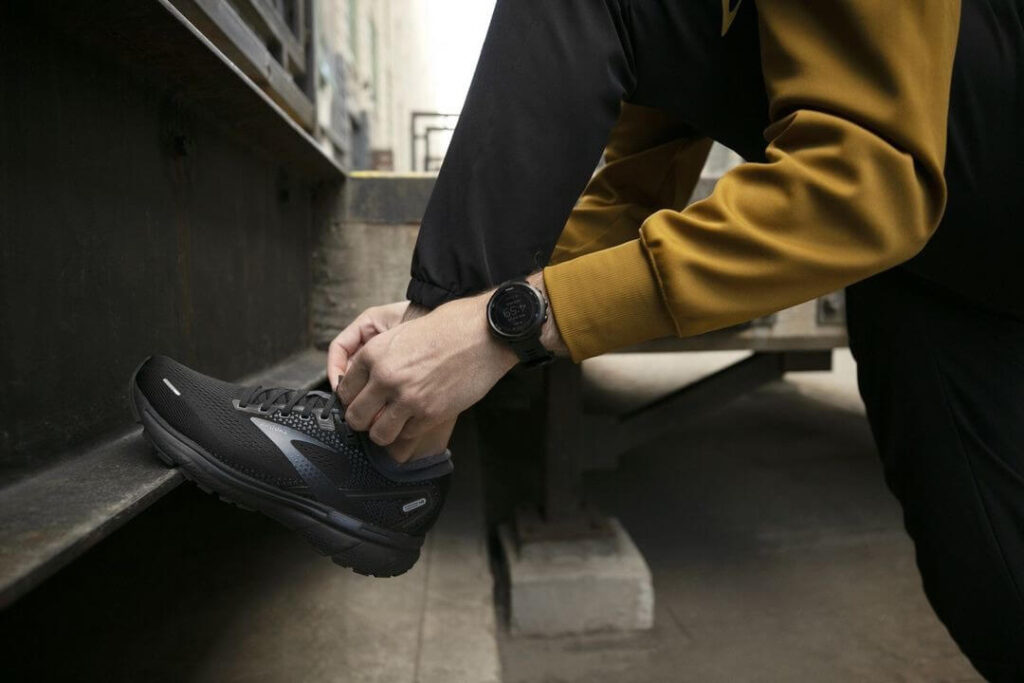
With its responsive midsole cushioning and wide range of sizes, it’s sure to keep your feet comfortable, regardless of terrain or foot type.
ASICS Men’s Gel-Kayano 28 Running Shoes
The ASICS Men’s Gel-Kayano 28 is designed for runners seeking superior stability and comfort. With their reliable cushioning system, these shoes give you optimal support during activities such as running, jogging, trail running, or everyday walks.

Runners with medium arches who overpronate will receive extra support in these shoes due to the two foam layers. They provide good shock absorption and a slightly firmer feel that keeps feet stable, even under stress.
FAQ
How Do ASICS Run Compared To Brooks?
Brooks and ASICS both offer a variety of choices catering to different preferences and needs. That being said, Brooks is known for its plush cushioning, which provides extra shock absorption. Conversely, ASICS focuses more on stability, which is provided by its firm inner layers.
Why Do Podiatrists Recommend Brooks Shoes?
Brooks has become one of the go-to brands for many podiatrists due to added comfort, cushioning, and support that can greatly benefit runners with any number of foot conditions or ailments.
Conclusion
When it comes to comparing Brooks and ASICS running shoes, there are a few key differences to consider. ASICS shoes have a snugger fit compared to Brooks’ larger toe box. In terms of cushioning and material used for each brand’s midsoles, Brooks uses foam, whereas Asics opts for gel-based designs.
Finally, in terms of overall durability and performance, reviews suggest that there is no clear winner, as both offer great options.
As for Brooks vs Asics sizing, the wide variety of sizes provided by both brands means you will be able to find the perfect fit, regardless of which company you go with. Just be sure to take into account the characteristics of your foot and the type of running load when choosing between Asics nimbus vs. Brooks ghost.
Which running shoes do you prefer: Asics or Brooks? Please share your favorites in the comments below.
Also read:
References:
- Tips For Runners: How To Prevent Plantar Fasciitis // Wphphysio: https://wphphysio.com.au/tips-for-runners-how-to-prevent-plantar-fasciitis/
- Foot Pronation Contributes to Altered Lower Extremity Loading After Long Distance Running // Frontiers Media: https://www.frontiersin.org/articles/10.3389/fphys.2019.00573/full
- Shock Response Spectrum Analysis of Fatigued Runners // MDPI: https://www.mdpi.com/1424-8220/22/6/2350
- More than the foot: the science behind how Guide RailsⓇ technology supports your run // Brooks Running: https://www.brooksrunning.com/en_us/blog/research-innovation/the-science-behind-guiderails-technology.html
- Photos are made by Brooksrunning, ASICS
Why Trust Us?
With over 20 years in Olympic weightlifting, strength training, nutrition coaching, and general fitness our team does its best to provide the audience with ultimate support and meet the needs and requirements of advanced athletes and professional lifters, as well as people who strive to open new opportunities and develop their physical capabilities with us.
By trusting the recommendations of our certified experts in coaching, nutrition, and sports training programming, as well as scientific consultants, and physiotherapists, we provide you with thorough, well-considered, and scientifically proven content. All the information given in the articles concerning workout programming, separate exercises, and athletic performance, in general, is based on verified data.
The product testing process is described in more detail here.
Oleksandr is a running coach and member of the Nike Run Club coaching team for 8 years. A participant in national and international competitions at distances from one kilometer to the ultra trail. Owner of mountain trail running camps. Nowadays Oleksandr is responsible for creating running training programs for athletes of various levels, coaching personally offline and online, conducts trail running camps in the mountains, participates in competitions.



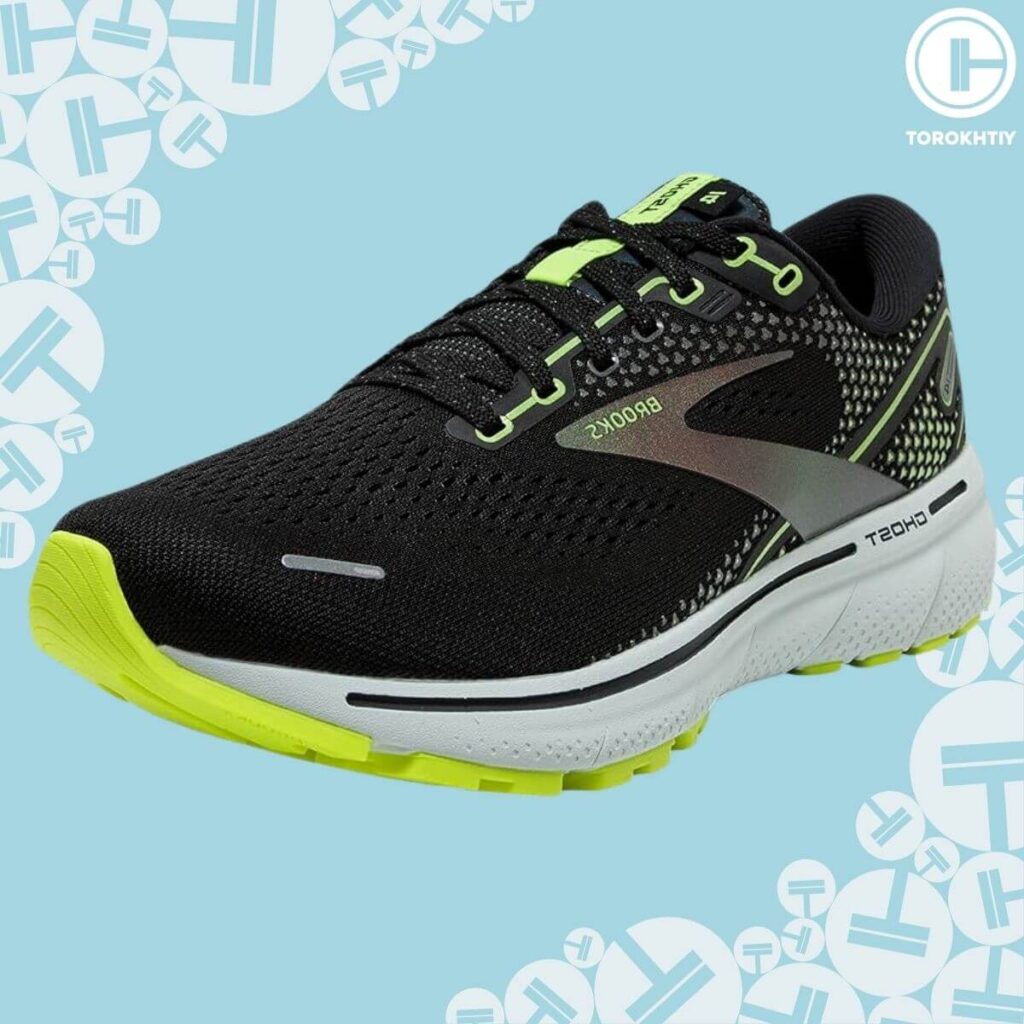
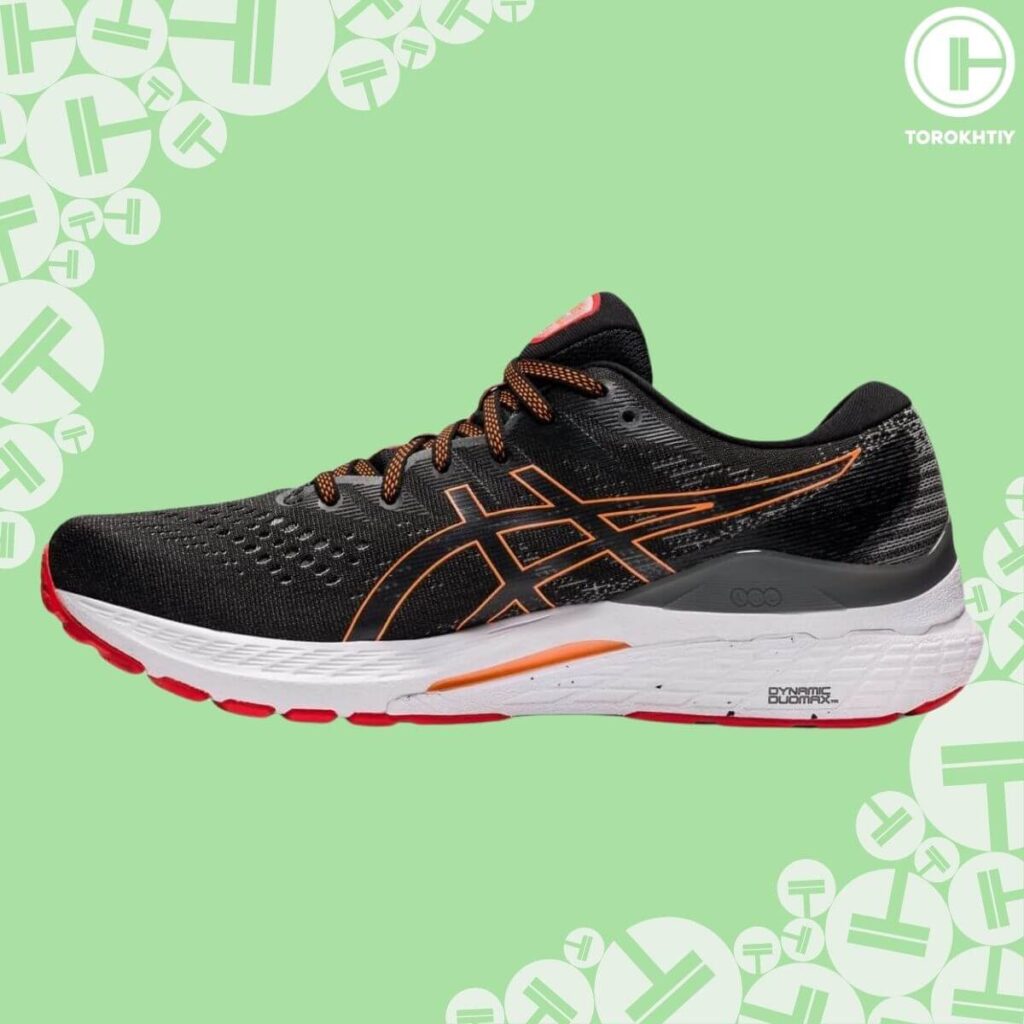
Still have questions after reading our article? Unlock your full potential by engaging with our experts and community! Don’t hesitate — leave a comment below and Oleksandr Zagrebelnyi will provide a personalized answer and insights to help you reach your goals.